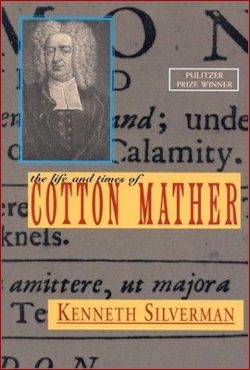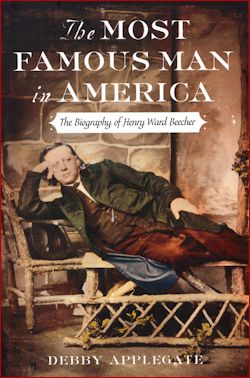

everal weeks before the Shepherds' Conference, all the plenary speakers were sent a sheet of survey questions. Their replies were excerpted and published in the Official Conference Guide.
The first question was, "What books have you read recently and how have they made an impact on your thinking?" The answer I gave was wordy and my reading list was—let's say "eclectic." (Some would say "motley.") So—no real surprise to me—my answer to that question didn't get published in the Guide. But I wanted to mention part of my answer here, because it prompted an interesting observation.
In answering that first question, I divided the lists of books I've been reading into "Biography & History; Theology; Commentaries; and Biblical Subjects." I didn't plan this, but the first three volumes I listed in the "Biography & History" category revealed an intriguing pattern:
The Life and Times of Cotton Mather, by Kenneth Silverman
The Most Famous Man in America: The Biography of Henry Ward Beecher, by Debby Applegate
Apparent Danger: [J. Frank Norris,] The Pastor of America's First Megachurch and the Murder Trial of the Decade in the 1920s, (also published under the title The Shooting Salvationist) by David Stokes
The first two books on that list won Pulitzer Prizes. The third one is as compelling as any Pulitzer winner—a pastoral biography in classic true-crime genre. All three are books I would highly recommend.
The subjects of all three books are celebrity pastors—Cotton Mather, Henry Ward Beecher, and J. Frank Norris—three very different men whose ministries left indelible imprints on three successive centuries of American history. They represent three vastly different strains of evangelical Protestantism. At the peak of their ministries, each of these three men could have legitimately claimed to be the most famous pastor in the country. All three were too enthralled with their own celebrity status. And all three were at the center of scandals that diminished their reputations.
Consequently, all three books are instructive about the various dangers of evangelical mass movements and man-centered leadership models. Large personalities often have large character flaws. Celebrity leaders and the personality cults they tend to cultivate are fraught with danger. Sycophants and simpletons tend to mimic and exaggerate the shortcomings of men with big egos while spurning the lessons of their failures. The aftermath leaves a long wake. It's my belief that ripples of the various errors made by these three men are still reverberating on the surface of American evangelicalism.
Mather
 Cotton Mather is the most likable of these three superstar historical figures. Two of his grandfathers (John Cotton and Richard Mather) were respected and respectable Puritan pastors who came to America with some of the first settlers. Their goal was to found a Puritan society. Cotton's father, Increase Mather, was also an excellent pastor and an influential political leader in the Massachusetts Bay Colony. So the heavy mantle of two previous generations fell on Cotton Mather.
Cotton Mather is the most likable of these three superstar historical figures. Two of his grandfathers (John Cotton and Richard Mather) were respected and respectable Puritan pastors who came to America with some of the first settlers. Their goal was to found a Puritan society. Cotton's father, Increase Mather, was also an excellent pastor and an influential political leader in the Massachusetts Bay Colony. So the heavy mantle of two previous generations fell on Cotton Mather.The controversy for which Cotton Mather is remembered—and the episode that tainted his reputation in American history—was of course the Salem Witchcraft crisis. Mather chronicled the events of that catastrophe in a manner calculated to put himself in the hero's role, but when the witch trials were discredited and even one of the leading judges, Samuel Sewell, publicly repented for his part in condemning people to death who turned out to be innocent, Mather became the main target of critics and satirists. His sometimes pompous, overbearing demeanor made him an easy mark for ridicule.
In later years Cotton Mather became intrigued with German pietism. The virile, gospel-centered Reformed teaching he had learned from his grandfathers slowly, almost imperceptibly became mixed and diluted with whiny moralism and pious-sounding platitudes. Mather was satirized by young Benjamin Franklin, whose imaginary alter-ego, a cranky, outspoken, holier-than-thou woman named Silence Dogood, was based on Mather's personality. (Mather had written a famous book titled Essays to Do Good.) It's my conviction that Mather's moralistic shift unwittingly helped open the door for Socinianism and Deism in the generation that followed him.
Beecher
 Henry Ward Beecher was likewise the son of a very famous preacher, Lyman Beecher. (The whole Beecher family were famous. One of Henry's sisters, Harriet Beecher Stowe, wrote Uncle Tom's Cabin. Another sister was an influential women's-rights activist. A niece was married to Edward Everett Hale.) The elder Beecher was originally a strict subscriptionist to the Westminster Confession. At first he opposed the doctrines and methodologies ("new measures") that Charles Finney made popular. But Lyman Beecher later softened his stance against Finney and he himself began to advocate the "new measures." The famous patriarch of the Beecher family was subsequently charged with heresy and tried by his session, but he was acquitted.
Henry Ward Beecher was likewise the son of a very famous preacher, Lyman Beecher. (The whole Beecher family were famous. One of Henry's sisters, Harriet Beecher Stowe, wrote Uncle Tom's Cabin. Another sister was an influential women's-rights activist. A niece was married to Edward Everett Hale.) The elder Beecher was originally a strict subscriptionist to the Westminster Confession. At first he opposed the doctrines and methodologies ("new measures") that Charles Finney made popular. But Lyman Beecher later softened his stance against Finney and he himself began to advocate the "new measures." The famous patriarch of the Beecher family was subsequently charged with heresy and tried by his session, but he was acquitted.The son, Henry Ward Beecher, a young, struggling pastor at the time, seemed to take his father's shift (and acquittal) as permission to throw off the shackles of orthodoxy completely. He began to employ methodologies and teach doctrines that were novel at the time but have become standard fare for today's seeker-sensitive and highly-contextualized ministry styles. Beecher was openly and proudly devoted to worldly values and stylish causes. He reveled in his celebrity status and the petty scandals his lifestyle provoked.
Then a major scandal broke when a parishioner (the wife of one of Beecher's assistants) admitted to her husband that she had engaged in an adulterous affair with Beecher. In those days adultery was a criminal offense, and Beecher was formally charged. After a scandalous public trial, which was played out on the front pages of every newspaper in America, the jury was unable to reach a decision, and Beecher returned to ministry. In my judgment Henry Ward Beecher bears as much responsibility as (perhaps more than) Charles Finney for the pragmatism that dominates evangelical ministry philosophy today.
Norris
 Frank Norris had a decidedly different style and he was a classic fundamentalist with regard to doctrine, but he shared Beecher's love of celebrity and his penchant for scandal. Norris pastored two churches concurrently—one in Detroit and one in Ft. Worth, TX. Before the era of jet travel, he would fly back and forth between the two cities, preaching on alternate weeks at one location, then the other.
Frank Norris had a decidedly different style and he was a classic fundamentalist with regard to doctrine, but he shared Beecher's love of celebrity and his penchant for scandal. Norris pastored two churches concurrently—one in Detroit and one in Ft. Worth, TX. Before the era of jet travel, he would fly back and forth between the two cities, preaching on alternate weeks at one location, then the other.Norris's most notorious scandal occurred when he shot a man to death in the pastor's study in Ft. Worth. He claimed it was self-defense, but there were no witnesses, and he was charged with murder. Norris's trial was also meticulously covered by every newspaper in America. Ultimately, he was acquitted, but he incurred the contempt and distrust of many, including a number of his own former followers.
That wasn't even Norris's only criminal trial. He was charged on another occasion with arson when the Ft. Worth Church burned under highy questionable circumstances, but Norris was acquitted of that charge as well. The various trials and acquittals seemed to make Norris more brash and pugnacious. He epitomized the "fighting fundamentalist" style. Later fundamentalists, including Jack Hyles and Peter Ruckman, openly revered and imitated him. The Bible Baptist Fellowship considers Norris a founder, and his controversial style is definitely still alive in that group.
Three centuries. Three celebrity pastors. Three completely different ministry philosophies. And yet there are so many similarities. Reading these three books in relatively close succession drove home the point for me that evangelicals historically haven't been very good at differentiating between men who have character and men who merely are characters.
 There's nothing inherently wrong with fame, of course. But a love of fame for fame's sake—the modern notion of celebrity—is deadly, especially in the church. We ought to learn the lessons of our own past, and we ought to heed the words of the Lord Jesus, who said, "Whoever would be great among you must be your servant, and whoever would be first among you must be your slave, even as the Son of Man came not to be served but to serve, and to give his life as a ransom for many" (Matthew 20:26-28).
There's nothing inherently wrong with fame, of course. But a love of fame for fame's sake—the modern notion of celebrity—is deadly, especially in the church. We ought to learn the lessons of our own past, and we ought to heed the words of the Lord Jesus, who said, "Whoever would be great among you must be your servant, and whoever would be first among you must be your slave, even as the Son of Man came not to be served but to serve, and to give his life as a ransom for many" (Matthew 20:26-28).











24 comments:
May quote your last comment about the difference between men who have character and men who are just characters for a facebook status, with your permission. That is very true, especially in light of all that is unfolding at Mars Hill currently.
Go for it.
An interesting aside, and perhaps irony: Who is the current Provost and a VP of Arlingtington Baptist College, which Norris founded?
Men who are characters...I have this image of a guy with a Mickey Mouse shirt on. And then there is another of a guy who put a bed on stage as he preached and then put his bed on the roof and slept with his wife there...and televised it in some fashion. Then another guy who smiles really bright and speaks softly with a southern twang. The thing is that the Word of God isn't something that I am left thinking of whenever I think of these "pastors". And isn't that the point of preaching...to point people to God's Word and explain it to them?
I always like to read good press about my relatives.
Cotton Mather - my (way back) cousin.
John Cotton - my great, great ... great, great grandfather.
For those who are not familiar with the connection between Mather and Cotton. John Cotton's daughter, Maria, married Increase Mather. Their first son was then named Cotton Mather. For those interested in historical trivia, John Cotton's second son was named Seaborn, because he was born on the way over to America.
Just finished reading the Shooting Salvationist. Would highly recommend it.
"...evangelicals historically haven't been very good at differentiating between men who have character and men who merely are characters."
Bingo. There's your money quote.
Law of Supply & Demand applies. The itching ears demand a supply of "characters."
Just as a side note, I believe the BBF that Norris is considered a "founder" of is the Baptist Bible Fellowship International (http://baptistbiblefellowshipinternational.org/). There was actually a split in this fellowship during the 90's and the more militant, hyper-conservatives are no longer a part of the fellowship. The fellowship's flagship school in Springfield, MO is my alma mater, and you would be hard pressed to find any students there that are as militant as Norris was.
Great post, Phil. Yesterday, a friend and I were talking about who we read or listen to 'on the outside', and had a sort of consensus as to avoiding 'faddish' or currently wildly popular fellows. I also really enjoyed Ian Murray's "Revivals and Revivalism" as a survey of how we got to where we are today.
Evangelicals historically haven't been very good at differentiating between men who have character and men who merely are characters."
A true Johnsonian proverb.
Phil- I'm curious about the Mather book: did it cover anything about Mather & Roger Williams?
I am still critiquing his theology and works, but the more I read of Williams and his impact I believe he may be a forgotten man who had character as opposed to some of the misguided New Englanders of his day.
I have been exploring the possibility that a celebrity pastor who lives and preaches the correct gospel of grace, whether reformed or unreformed should be able to resist the temptations that will come with celebrity, despite the default me-first human condition. The thought being that something has to confront the false gospels out there that are united by TV and Internet media and of course, there own celebrities. Celebrities with the right message combined with para-church orgs with the right message combined with denominations with the right message might actually be able to change the world-view that christianity is a me-first selfish hypocracy. As you said, fame in itself is not sin. But I agree fame is a slippery slope. In this day and age, if world-view matters, and I believe it does, fame will be helpful to the cause. The old question is the same... Where do we really draw the line for unity's sake? But the more we argue unity, the more we tend to just wound ourselves, when non-essentials find their way into the discussion.
Now Phil, if you had just named this post appropriately (like, "Three Highly Recommended Books that You Will Want to Read Right Away Even Though Your 'To Read' List is Already Waaaaay Too Long") then I could've just skipped this post and spared my "To Read" list. Fascinating observations regarding the ripple effect in today's Evangelicalism.
Thank you for the contrasting verse at the end. Leaders serve.
"Men who are characters...I have this image of a guy with a Mickey Mouse shirt on. And then there is another of a guy who put a bed on stage as he preached and then put his bed on the roof and slept with his wife there...and televised it in some fashion. Then another guy who smiles really bright and speaks softly with a southern twang. The thing is that the Word of God isn't something that I am left thinking of whenever I think of these "pastors". And isn't that the point of preaching...to point people to God's Word and explain it to them? "
Funny, Robert...I thought of the same three characters. Hmmm..
Phil, thanks for making me aware of this book!
I, also, enjoyed hearing about my relatives.
Cotton Mather was a uncle with Increase and Richard Mather both being grandfathers.
I guess Squirrel and I are related. :/
Where has Tom Chantry gone? I miss his comments.
I am a big-time student of history, loved this broad perspectived article. I really learned something here! Thank you.
Thankfully there were some mass movements whose leaders remained faithful, e.g., Moody, Torrey, Graham. The key difference here, I think, was that these men were not seeking innovation for the sake of popularity, but were focused only on preaching the Gospel. Contrast that with, say, the wild showbiz style of Sister Aimee.
Beecher, if I recall, continued on after the scandal, without repercussions. I think he went about lecturing on the compatibility of Darwinism and Christianity.
Another excellent post. Thanks.
I didn't know Cotton Mather slipped into moralism. It's good to see the flaws and sin of our leaders.
We always need to compare ourselves to Christ. My pastor is preaching through John, and it has been such a blessing to see the perfection of Jesus, and yet in such a human way.
What a Master and Friend He truly is. And what a Savior!
Temple Baptist Church that Norris Started in Redford MI is now North Ridge Church in Plymouth MI.
Where has Tom Chantry gone? I miss his comments.
Blogger's heightened security has finally outed Tom as a robot.
An important implication of this post is the responsibility of those who follow these "preachers." As Martin Lloyd-Jones warns in several places, the congregations' appetite for stimulation, excitement, amusement and all the other natural human tastes plays a role in the "success" these preachers experience.
These three personalities would not have had the influence they exerted had there not been those who "used" them to satisfy relatively prurient tastes while still assuaging their consciences by satisfying them while "going to church." Driscoll fully understands this in pandering to the natural appetite for naughty talk; other speakers exploit other tastes, like the natural interest in the promise of a good future or of self esteem. They build congregations that are, for many, at least, using them as much as they are "using" the congregations for building personal empires, though theirs is the greater condemnation.
The sheep play a role, too -- we are responsible for examining what we are fed, commanded to check up on where the shepherd is leading us. It isn't like he has the only copy of the Bible in the house.
Anyway, a great reminder of the temptations that are in the church as well as outside.
Citation Squirrel, jake frys and myself are all related to Cotton Mather? Growing up in an unchristian home, I heard nothing but bad things about man. It wasn't until I started reading things by good theologians that I got the full story. Thank you Phil.
Post a Comment